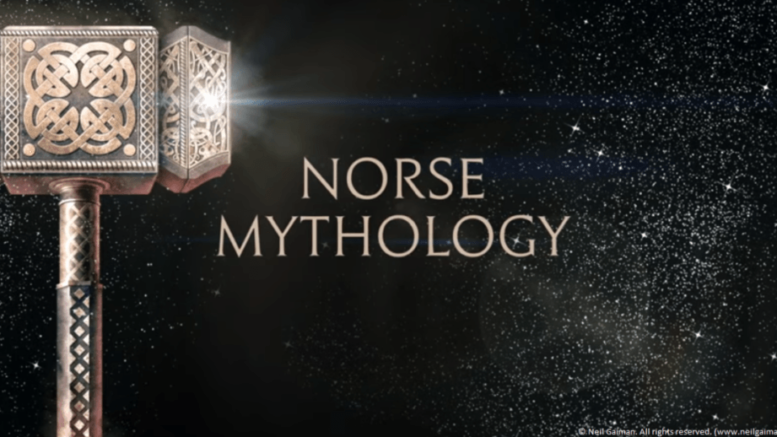Neil Gaiman begins his novel, Norse Mythology, with a brief introduction about how he first encountered legends of Thor, Odin, Loki, and the rest of the Norse gods. It struck a cord with me because it was the same way I did, reading comic books.
While Marvel kept many of the character, location, and weapon names the stories are much different. The Marvel Comics Thor and the version of Thor you see in the Marvel Cinematic Universe isn’t the same person as is in the original myths. None of the characters are actually. If your only exposure to these stories is through a comic book or film you any be surprised to learn you don’t really know the story of these gods.
In Norse Mythology Gaiman retells the bitter sweet story of the Norse gods from their origins to their demise. The legends are written in modern English but with a classic feel. Each chapter tells a separate tale. We learn how Thor truly received the mighty hammer Mjolnir and how Odin lost his eye. We also meet a number of the Norse gods and other creatures. Each story builds a larger narrative culminating with the events of Ragnarok, the epic final battle of the gods and the end of all things.
While reading the novel Gaiman captures the feel of what was passed on by way of oral history. You can imagine these stories being told in ancient times in grand halls during celebrations or over a fire at night as cautionary tales. As I read the book I felt connected to these timeless narratives. These stories exist today for us to enjoy because people, long since dead, made sure they were passed from generation to generation.
Each chapter is a quick read with several only being a dozen or so pages long. While it is a short book, just under 300 pages, it is filled with action, humor, and treachery. The Norse gods frequently find themselves in peculiar dilemmas which are used by the story tellers to explain natural occurrences and the world as we see it. For example, the “real” cause for earthquakes is explained and tied directly into the Norse mythos.
You needn’t have had any previous experience or knowledge of ancient history to enjoy this book. Yes, there are a lot of people, places, and creatures to keep track of in your head as you are reading but Gaiman addresses this problem. There is a glossary at the end of the book to help keep everything straight. I found myself referencing it often to refresh my memory.
This isn’t necessarily a scholarly work but it is an entertaining one. I found it very hard to put the book down. I had to finish a chapter before breaking because I just had to know how Thor or Loki got out of a situation.
There is a theme in all of the chapters underlining the fate of the gods. Their time will end. The final battle, Ragnarok, is destined to happen and for all their might the gods are powerless to stop it. This sense of foreboding grounds some of the fanciful plots.
The book is by no means gloomy, it is quite the opposite. There is a lot of adventure packed into this collection of stories. Ragnarok gives us hope that with the ending of one age there is potential for the start of a new one.
If you think you might be interested in a modern take on the ancient tales of the Norse gods I would recommend this book to you. If you have seen Thor on television, movies, or in comic books and want to know more I would suggest it for you too. Be aware that these aren’t the same characters you will see on screen or in print. Neil Gaiman keeps true to the historical Norse origins. The Avengers are no where to be found in this book but plenty of history is.
I would be interested in hearing your thoughts on Neil Gaiman’s Norse Mythology so feel free to comment below.
Best regards,
Greytome

Be the first to comment on "Book Review: Norse Mythology by Neil Gaiman"